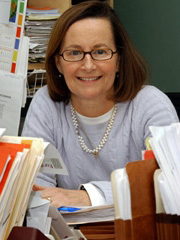Carla DeStefano is the Executive Director of Stop Wasting Abandoned Property (SWAP), a nonprofit organization which seeks to provide affordable housing opportunities for persons of low and moderate income and revitalize urban neighborhoods.
How did SWAP Inc. come into being?
SWAP was founded in 1975 by a pioneering group of neighbors who came together to reverse the blight that Providence suffered during the 1960’s and 1970’s as urban unrest moved across the country. Instead of attempting to reverse the blight by demolishing homes, part of the group broke away and formed the organization Stop Wasting Abandoned Property – SWAP.
As people left the city and more and more houses were abandoned, SWAP’s first initiative was to establish “homesteader” program matching urban pioneers with homes that needing revitalizing. There are 1200 or so of these houses scattered around the Providence neighborhoods from this era.
So what role do you play in the provision of affordable housing today?
Working with multiple partners including State and City public agencies, SWAP competes for funding to support the development of affordable housing. SWAP now builds new buildings, renovates foreclosed properties and restores historic houses.
Why have you moved to mixed-use and commercial spaces?
Neighborhoods are not just about housing. It’s about everything from a barbershop to a hairdresser to a dry cleaner to restaurants. Having a combination of spaces is an urban strategy to create housing and build lively communities.
What trends do you see occurring in the world of affordable housing?
The cost of housing is escalating throughout the country. There are many factors: zoning, density, cost of materials, NIMBYism, to name a few. Because of the lack of supply of skilled labor, we often have to compete with for-profit developers for single builders. Since we’re serving an entry-level housing market with the intention that people can afford these houses, the budget becomes a real challenge. We’re using the same materials as for-profit developers but we can only charge so much. Consequently, very few developers in the region are developing entry-level homeownership.
What are your thoughts on the 19 million dollar tax break that the City Council granted to a development for luxury apartments around the Brown campus?
We do not have enough housing. Currently, the supply is low, the demand is high, and prices are escalating. Development is better than no development. People need a place to live. If they are priced out of one area, they’ll seek housing elsewhere. The natural progression of this is a vicious cycle of housing price increases.
In Providence’s abundance of colleges and universities puts additional pressure on the housing supply. Building more housing for students is not a bad thing. Presumably, it could actually make more housing available in the marketplace for non–students.
We cannot just talk about affordable housing, we need to create it, and we need to be thinking outside the box and advocating for change. In order to build our economy, we have to prove that we can provide housing that will be affordable to the people building their lives here.
